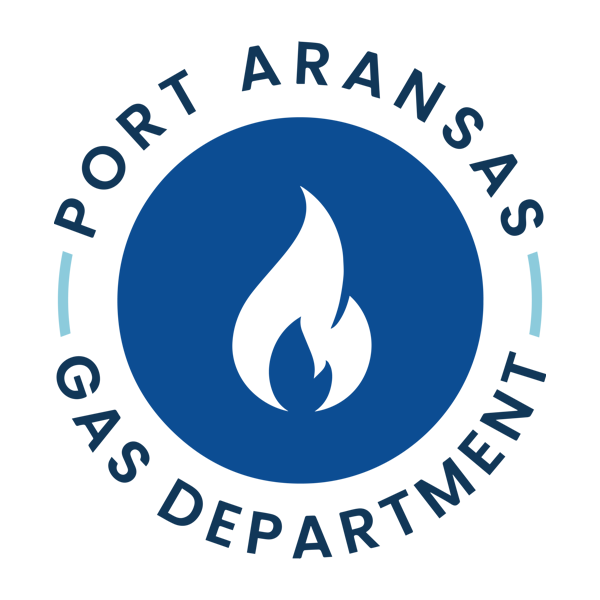Benefits of Having Natural Gas
Cooking, Heating, and Drying With Natural Gas
When it comes to cooking, heating, and drying the cost, comparison of natural gas as opposed to electrical energy is significant. One cubic foot (CF) of natural gas is equal to 1,015 British Thermal Units (BTU) and it takes 1-Kilowatt hour (kWh) to equal 3,413 BTU. In 2009, the cost of 1,000 CF of natural gas (1 MCF) to the City of Port Aransas Gas Department consumers averaged $4.59 ($0.00452 that is less than ½ of a cent/1,015 BTU). The average cost in 2009 for electricity in Texas was 12.93¢ ($0.1293) per kWh (source: http://www.eia.doe.gov). Natural Gas cost to produce one kWh of energy. Only 1.54¢ ($0.0154), that is a significant savings!
When comparing Natural Gas Appliances to Electric Appliances, each form of energy has its advantages, for example: lights, computer, TV, dishwasher, refrigerator, etc? there is no substitute for electricity. Nevertheless, for cooking, heating, and drying, natural gas is the most efficient and cleanest option we have today; reason being that natural gas releases heat quicker and much easier, while electric heating elements require significantly more energy for a smaller amount of heat. Not to mention, natural gas appliances are environmentally friendly, natural gas burns clean. According to consumers, natural gas is the best natural resource today to cook, heat, and dry.
Cooking
Energy Star, the U.S. government's measuring stick for consumer goods? greenhouse gas emissions, does not mandate energy use standard for stoves and cooking ranges. The U.S. Department of Energy estimates that cooking accounts for only 4.5% of the energy we use at home (source: http://www.energy.gov). Because that?s a relatively small amount of our household carbon emissions, the question of whether a gas or electric stove and cooking range saves more energy isn?t one people have been asking. Nevertheless, because gas burners provide instant heat, and cooks have greater control over the temperatures, they are more energy efficient than their electric competitors. You instantly get a flame when the gas stove or cooking range is turned on, whereas electric stoves and cooking ranges take longer to heat. Models that use an electric ignition rather than a continually burning pilot light will save up to 40% of natural gas.
Heating
Two types of heat for your home or business, the warm air keep us comfortable during the winter and water for that warm bath. There are several ways to heat your water efficiently, just to discuss a couple; the most cost effective is the use of the Energy Star qualified natural gas tankless water heater. These units typically can save a family more than $100 per year on natural gas bills compared to an already efficient standard storage natural gas water heater, because water will only heat when it?s needed. Energy Star qualified natural gas tankless water heaters cut water heating expenses by 30% while also providing continuous hot water delivery. Choosing an Energy Star qualified storage natural gas water heater can save about $30 a year. That is a $390 savings over the 13-year lifetime of the water heater. It just paid for itself! Did you know? If just 1 household in 10 bought Energy Star qualified heating and cooling equipment, we would prevent annual greenhouse gas emissions of 15 billion pounds, equivalent to the emissions from almost 1.3 million cars (source: http://www.energystar.gov). Energy Star qualified natural gas furnaces have annual fuel utilization efficiency (AFUE) ratings of 90%, or greater, making them up to 15% more efficient than standard models. A natural gas furnace heats your home or business quickly, delivering the warmth efficiently.
Clothes Dryers
Like the stove and cooking range, Energy Star does not mandate energy use standard for clothes dryers. It is because most of them use similar amounts of energy, which means there is little difference in energy use. However, the cost savings of using natural gas vs. electricity are significant. Natural gas dryers cost more to begin with, approximately $50 more as opposed to the electric model, but natural gas dryers will cost less to operate over their lifetime. Another advantage, natural gas dryers are easier on fabrics drying clothing quicker and at specific temperatures to evaporate water adequately.

James Freeman
Superintendent
Phone: 361-749-6330
Karrah Bass
Utilities Clerk
Phone: 361-749-4111, Ext. 230
Gloria Lara
Utilities Clerk
Phone: 361-749-4111, Ext. 231
